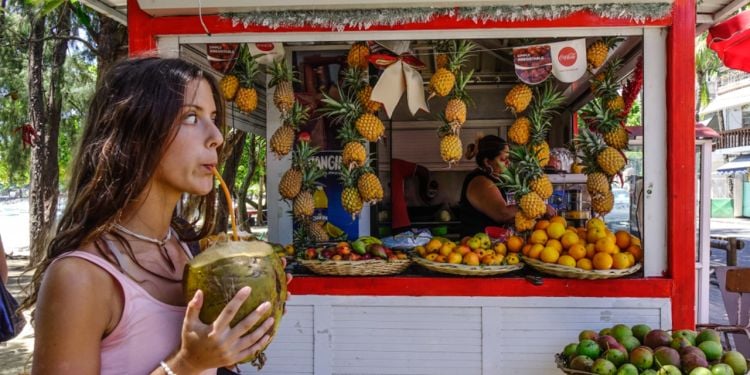How to integrate as an expatriate in Mauritius

Moving abroad is not only about changing countries but also about integrating into a new culture and sharing the life of its inhabitants. Here is how to make the most of your new life in Mauritius as an expat.
What language is spoken in Mauritius?
The official language of Mauritius is English. However, French and Mauritian Creole are the most widely spoken languages on the island, Creole being naturally more widespread.
Mauritian Creole, Kreol Morisien, is based on French, but given the configuration of the Mauritian nation, there are English, Bhojpuri, Chinese, and African dialects... A real melting pot!
Is it necessary to speak Creole to integrate into Mauritius?
Mauritians are, for the most part, trilingual, and being a warm and welcoming nation, they will try to talk to you in the language that comes most readily to you. However, in a social context where there are many Mauritians, the conversation will quickly switch to Creole, despite the Mauritians' good intentions. In order not to miss anything and to understand the nuances and subtleties, it is advisable to learn at least a few Creole words or expressions. It is nothing less than an effort to integrate, especially since Mauritians are always proud and happy to hear expatriates speak Creole or at least try to.
Mauritian Creole (Kreol Morisien) is easy to master and has its own grammar and spelling, and the people around you will be happy to teach you! The Internet is full of websites that will give you basic phrases. Nevertheless, you should go further than the purely touristy idioms. For that, you just have to listen carefully to understand a little bit of Mauritian Creole, many words of which are derived from French. The Creole language follows the principle of phonetics; the written letters are all pronounced.
The most effective way to learn a new language is to get started and surround yourself with as many Creole speakers as possible. Mauritians are friendly and are likely to welcome you, especially if you show interest in them and their culture.
Learning to speak Creole is more complex than understanding it, but it is part of your integration into the country. The unconditional accent of expatriates often amuses Mauritians, but they will appreciate your efforts and might laugh a little, but it is all in good faith. The Creole language is also evolving; the legendary "Bonzur" used by most tourist guides is hardly used anymore.
Some words and expressions that you will frequently hear in Mauritius
Ayo
The most heard word, the simplest and most effective because, depending on the intonation given, it can take on all possible meanings.
Mari
Very frequently used as a superlative, it emphasizes the word it precedes.
Bonzur, ki pozisyon? / Ki manyer?
Hello, how are you?
Mo byin / Korek
I'm doing well
Kot to sorti?
Where are you from?
Kot to pe ale?
Where are you going?
Kifer?
Why?
Ki to pe fer zordi? / Ki rol zordi?
What are you doing today?
Kouma to apele / Kouma ou apele?
What is your name?
Ou marye? Ou ena zanfan?
Are you married? Do you have children?
Kan to vinn lakaz? Taler mo vini
When will you come home? I will come later
Kot to rester?
Where do you live?
Zordi pena lapli, mo al lamer
Today it's not raining; I'm going to the beach.
Ou kontan Moris?
Do you like Mauritius?
Ki ler la?
What time is it?
Mari zoli sa!
It's so beautiful!
Mo kontan twa!
I love you!
To byin zoli
You are very pretty / You are very beautiful
The Mauritian cultural code
Congeniality and peaceful living
Mauritian culture is based on living peacefully together and congeniality. Although things have not always been smooth, Mauritians like to live in a community. They like to gather around a table for dinner, lunch, or for a big party for a wedding or a birthday. In residential areas, especially in working-class neighborhoods, the neighbors get along well and help each other out.
As Mauritius is the meeting place of many cultures - including Indian, African, Chinese, Arab, and European cultures - there is a lot of sharing between the different segments of the Mauritian population. It is customary, for example, that for religious and cultural holidays or celebrations, some share sweets, food and presents with others, even if they do not share the same beliefs or culture.
Family values
Family is sacred to Mauritians. In fact, it is customary for young Mauritians to live with their parents until they are ready to get married and start their own families. It is not at all uncommon for the whole family to be involved in a family member's decision-making, whether it is about marriage, choice of housing, or anything else. A habit that might be difficult to understand for expats coming from Western countries.
Respect for elders is also very important for Mauritians. It is relatively rare for Mauritians to send their elderly parents or grandparents to retirement homes.
Greetings
Depending on the relationship with the interlocutor, the greeting can be a simple "hello", a handshake, or even a kiss, two kisses on the cheeks in fact.
Proximity and friendship
It is relatively easy to make close friends in Mauritius. Mauritians are very open, will invite you to have a drink or dinner at their place, and will introduce you to their families and friends quite quickly if you manage to forge a friendship with them.
Punctuality
It is "island life" all the way here. Mauritians have a very laid-back way of doing things, and their lives will not be dictated by a clock! Do not take it personally if a Mauritian is late to a party, it is perfectly normal and does not constitute a lack of respect. Besides, parties always start at least an hour after the stated time, so avoid getting there on time. However, they are usually quite punctual when it comes to appointments and professional interviews.
Where to meet the locals in Mauritius?
As an expatriate, it can be comforting to only surround yourself with your fellows or other expats; however, over time, this can lead to a feeling of remoteness and disconnection with your host country's environment. At work, or among your neighbors, don't hesitate to reach out to Mauritians. You will gradually be included in the extra-professional activities. All this is to say that Mauritius is not just about expatriate neighborhoods and regions or luxury hotels where you can spend the weekends.
Meeting locals is easy. Try chatting with locals at the public beach, where families, couples, and groups of friends do not hesitate to share their picnic and will not hesitate to engage in small talk with foreigners. Sometimes, all it takes is a smile and a hello to surround yourself with a family ready to integrate you into their group.
You can also join clubs, gyms, or activity groups.
The workplace is also a great place to meet new people! If you've just arrived and you've already been invited to a colleague's wedding: just go. Not only will your presence flatter your host, but more importantly, they will introduce you to many other people during the event.
Discover everyday Mauritius
The North of the island is full of activities, dynamism, shops, bars and restaurants, but beyond the tourist areas, Mauritius is alive! If you don't have a car, take the bus or rent a car and make your own route. Go to the market (the fair / bazaar) on weekdays if possible or on weekends, buy your bread from a bakery from time to time, and have lunch in a small unpretentious snack.
Don't hesitate to bring your own picnic to the beach! This family activity is an integral part of Mauritian culture. In the evenings, go for a walk at Marie Reine de la Paix or around the Champ de Mars, it's the perfect opportunity to let the kids run around and play.
Eat like a local in Mauritius
Yes, Mauritius is a multicultural country, used to welcoming expatriates from all over the world. In this sense, for example, supermarkets and stores are not short of imported items, so much so that today we find Korean, Spanish, American ingredients, and so on. Nevertheless, your goal is to integrate, so let yourself go, drop what you're used to, and try out local ways of doing things.
Mauritian cuisine is an important part of the country's culture. Mauritians like to eat at home and outside. Mauritian food is spicy, but chili is always optional. If you are a fan of chili, however, make the most of it; Mauritius is chili lovers' paradise!
On your way to work in the morning, you will probably notice workers buying a pair of roti from one of the many motorcycle vendors. Some also take a break at 10:00 a.m. to get a snack from a snack bar.
On the streets, “rotis” and “dal puris” are the stars of on-the-go meals! These are a sort of pancake filled with cooked and salted condiments (vegetables accompanied by a sauce, chili, chicken, fish, etc.).
There are also fried snacks, usually with a vegetable base or filling (“gato pima”, samosas, “patés”, “gato arouille”, etc.), dumplings (steamed chicken, fish, beef, lamb, sometimes pork, and/or vegetables balls) with broth and chili, curries and biryani.
To fill up on fruit, we have the "confits". These are fruits pickled in an acidic, sweet and salty mixture at the same time and served topped with "tamarind paste", powdered chili and salt and an additional chili paste.
As for fresh fruits, they are a delight throughout the year, reaching their peak in early December with watermelons, mangoes, lychees and longans.
Accept the invites from Mauritians!
Just as an example, in Mauritius, when someone gets married, the whole neighborhood participates! In Indian and Muslim communities, the festivities can last up to a week. So don't be surprised if you are invited by a colleague, one of your neighbors, or a shopkeeper you see regularly. Religious celebrations are no exception. Divali, for example, is the Hindu festival of lights, but above all, a moment of extraordinary communion between all the communities of the country.
For certain celebrations, the communities concerned meet at the beach with their families, eat, drink, sing and dance the sega, and for others, it will be a shared meal at a host's house, etc.
By the way, here is the 2023 calendar of celebrations:
- New Year: Sunday, January 1
- New Year: Monday, January 2
- Spring Festival: Sunday, January 22
- Commemoration of the Abolition of Slavery: Wednesday, February 1
- Thaipoosam Cavadee: Saturday, February 4th
- Maha Shivaratree: Saturday, February 18
- National Day: Sunday, March 12
- Ugadi: Wednesday, March 22
- Eid-Ul-Fitr: Saturday, April 22 (subject to confirmation, usually the evening before)
- Labor Day: Monday, May 1
- Ganesh Chaturthi: Wednesday, September 20
- All Saints' Day: Wednesday, November 1
- Commemoration of the Arrival of Enlisted Workers: Thursday, November 2
- Divali: Sunday, November 12
- Christmas: Monday, December 25th
Culture in Mauritius
Mauritian culture is rich in the diversity of its people. Theater, music, painting, etc., there is something for everyone.
What you absolutely need to know about Mauritian culture is the sega. This music and dance that comes from the enslaved people and their descendants is the music that unites all Mauritians. You will hear it at weddings, parties, supermarkets, in the streets, etc.
The endemic genres in Mauritius are Geet Gawai, with Hindu and Indian influences and seggae, a mix of sega and reggae.
Concerts and other events in Mauritius take place in pubs, clubs, restaurants and other cultural venues, such as the French Institute of Mauritius or the Caudan Arts Centre, every weekend.
Mauritian theater is not well known, but if you are interested, please check what the Trup Sapsiway is doing and follow the Caudan Arts Centre page.
Exhibitions are also often held, notably in Port-Louis at the Edith Galleries or at the Caudan Arts Centre.










